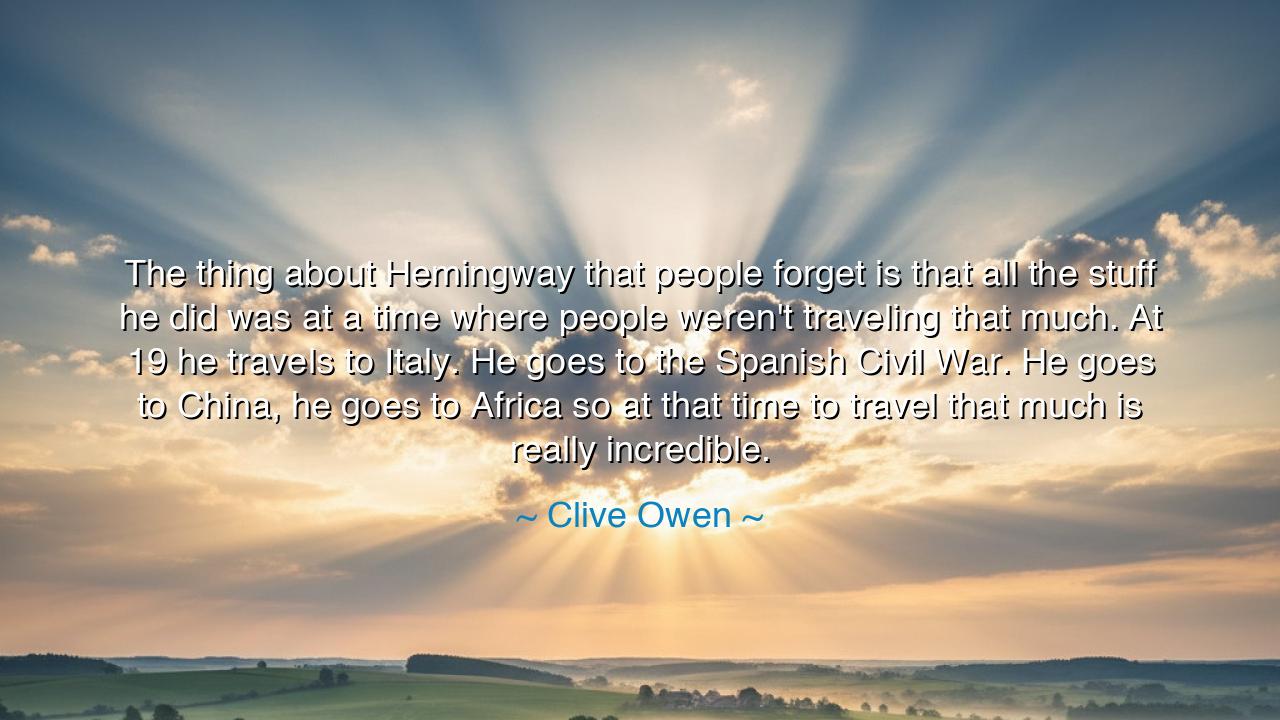
The thing about Hemingway that people forget is that all the
The thing about Hemingway that people forget is that all the stuff he did was at a time where people weren't traveling that much. At 19 he travels to Italy. He goes to the Spanish Civil War. He goes to China, he goes to Africa so at that time to travel that much is really incredible.






The words of Clive Owen — “The thing about Hemingway that people forget is that all the stuff he did was at a time where people weren’t traveling that much. At 19 he travels to Italy. He goes to the Spanish Civil War. He goes to China, he goes to Africa so at that time to travel that much is really incredible.” — awaken in us the image of a man who lived not only as a writer, but as an adventurer whose footsteps crossed continents. Owen reminds us that what seems ordinary to modern eyes — journeys by plane, by car, by train across oceans and borders — was once extraordinary. In Hemingway’s time, travel was no simple convenience; it was a bold act of will, a statement of courage, a testament to hunger for life.
To go at nineteen to Italy, to serve in the crucible of war, was to leap headfirst into history itself. Hemingway did not sit apart from the great struggles of his time — he stepped into them. He entered the trenches of the Spanish Civil War, stood among soldiers and civilians alike, and bore witness to humanity’s darkest struggles and brightest acts of valor. He journeyed to China, to a land mysterious to the Western world, and to Africa, where both beauty and danger tested the spirit. These were not the acts of a passive observer but of one who sought to live life fully, so that his pen might not only imagine, but testify.
The ancients would have called such a man heroic, for he lived as though life were an epic, each journey a chapter in the saga of his soul. Like Odysseus, he was shaped by his voyages; like Herodotus, he bore the tales of distant peoples; like Xenophon, he was both soldier and scribe. Yet unlike those who merely chronicled the deeds of others, Hemingway made his own life the furnace in which his words were forged. His novels burn with authenticity because he first allowed life itself to brand its mark upon him.
History offers us other figures who understood the power of the journey. Marco Polo’s travels to the East brought to Europe the wonders of China. Alexander’s campaigns across Asia carried Greek thought into distant lands. But in Hemingway we find not empire-building nor merchant ambition, but the hunger of the artist to see, to feel, to know. He was not driven by conquest, but by a deep yearning to enter into the very marrow of human experience. That is what Owen calls us to remember: that in an age where few traveled far, Hemingway’s ceaseless movement was an act of daring that set him apart.
Yet there is also a deeper meaning: that the greatness of Hemingway’s work cannot be separated from the greatness of his willingness to live. His novels of war, love, death, and survival are not abstractions but reflections of a man who had walked the earth widely, who had tasted its sorrows and its splendors firsthand. Without his journeys, his words would not carry the same weight. To write powerfully, he knew he must first live powerfully.
The lesson for us is clear: do not wait for life to come to you. Seek it, embrace it, step into it, even when the way is uncertain. In an age where travel is easier than ever, many still remain enclosed in their own small worlds, never daring to go beyond what is familiar. But as Hemingway’s life shows, the road itself is the teacher, the trial, and the source of richness. To step out is to expand not only your vision, but your very soul.
In practice, let each listener take this wisdom into their own life. If you cannot cross oceans, then at least cross boundaries of thought, culture, and experience. Seek out new voices, new lands, new trials that test and shape you. Write your own story not from the safety of one place, but from the fullness of a life lived with courage. For it is not comfort that carves greatness, but the willingness to wander, to risk, to see.
Thus Clive Owen’s reflection upon Hemingway is not merely about one writer’s journeys, but about the eternal truth that greatness is born from movement, from daring to step where few have stepped. To travel when the world stands still is to live ahead of one’s time, and to live so boldly is to leave behind not just words, but a legacy that endures through the ages.






AAdministratorAdministrator
Welcome, honored guests. Please leave a comment, we will respond soon